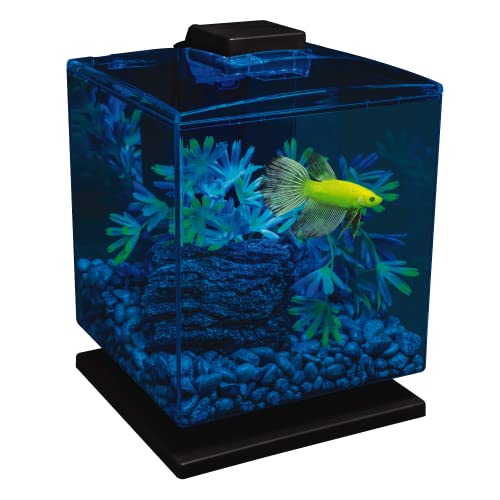Discover the physical characteristics and behavior of detritus worms, the of infestation like overfeeding and poor maintenance, the effects on the ecosystem, and how to prevent and control them for a healthy fish tank.
Identifying Detritus Worms in Fish Tank
Physical Characteristics
Detritus worms, also known as sludge worms, are small, thread-like organisms that are commonly found in fish tanks. These worms are typically white or translucent in color, with some species exhibiting a reddish hue. They have a segmented body, resembling tiny earthworms, and can grow up to half an inch in length. One distinguishing feature of detritus worms is their constant movement, wriggling around in the substrate or swimming in the water column.
Behavior in Tank
Detritus worms play a crucial role in the ecosystem of a fish tank, serving as decomposers that break down organic matter such as uneaten food, fish waste, and dead plant material. They are often found in areas with high levels of detritus, such as the substrate, filter media, and decorations. While detritus worms are generally harmless to fish, their presence in large numbers can indicate poor water quality and inadequate tank maintenance.
In order to properly identify detritus worms in your fish tank, observe their physical characteristics and behavior. If you notice an abundance of these worms, it may be a sign that your tank needs attention in terms of feeding practices and cleaning routines. By staying vigilant and proactive in managing detritus worms, you can ensure a healthy and thriving aquatic environment for your fish.
Causes of Detritus Worm Infestation
Overfeeding
Overfeeding is a common mistake that many fish tank owners make, leading to an overabundance of detritus worms in the tank. When fish are given more food than they can consume, the excess food falls to the bottom of the tank and decomposes, creating the perfect breeding ground for detritus worms. These worms thrive on the excess nutrients from the uneaten food, multiplying rapidly and causing an infestation.
To prevent overfeeding, it is essential to feed your fish only the amount they can consume in a few minutes. Avoid adding more food if there are still leftovers in the tank, as this will only contribute to the build-up of detritus and attract more worms. By practicing proper feeding habits, you can help maintain a healthy balance in your tank and reduce the risk of a detritus worm infestation.
Poor Tank Maintenance
Another common cause of detritus worm infestation is poor tank maintenance. Neglecting to clean the tank regularly can lead to a build-up of organic waste, uneaten food, and debris, providing an ideal environment for detritus worms to thrive. These worms feed on the decaying matter in the tank, further contributing to the accumulation of detritus and causing water quality issues.
To prevent detritus worm infestations due to poor tank maintenance, it is crucial to establish a regular cleaning routine. This includes vacuuming the substrate, removing any debris, and performing partial water changes to eliminate excess nutrients and waste. By maintaining a clean and well-balanced tank environment, you can help prevent detritus worms from taking over and ensure the health and well-being of your fish.
Effects of Detritus Worms on Fish Tank Ecosystem
Detritus worms may seem harmless at first glance, but their presence in a fish tank can have significant impacts on the overall ecosystem. In this section, we will delve into the effects of these tiny creatures on nutrient cycling and water quality.
Nutrient Cycling
Nutrient cycling is a crucial process in any aquatic ecosystem, including fish tanks. Detritus worms play a role in this cycle by breaking down organic matter such as uneaten fish food, fish waste, and decaying plant material. As they consume these organic particles, detritus worms help to release essential nutrients back into the water, which can then be utilized by plants and other organisms in the tank.
However, an overabundance of detritus worms can disrupt the delicate balance of nutrient cycling. If left unchecked, these worms can consume too much organic matter, leading to a build-up of waste and a depletion of nutrients in the water. This imbalance can have detrimental effects on the overall health of the fish and plants in the tank, ultimately impacting the entire ecosystem.
To prevent disruptions in nutrient cycling caused by detritus worms, it is essential to maintain proper feeding practices and regular tank cleaning. By feeding your fish only what they can consume in a few minutes and removing any uneaten food promptly, you can help to reduce the amount of organic matter available for detritus worms to feed on. Additionally, performing regular water changes and cleaning the substrate can help to remove excess waste and restore nutrient levels to a healthy balance.
Water Quality
In addition to nutrient cycling, detritus worms can also have an impact on the overall water quality in a . As these worms consume organic matter, they produce waste in the form of castings, which can contribute to an increase in ammonia and nitrate levels in the water. Elevated levels of these compounds can be harmful to fish and other aquatic organisms, leading to health issues and potentially even death.
To maintain optimal water quality in your fish tank and prevent the negative effects of detritus worms, it is essential to monitor and control the levels of ammonia and nitrate. Regular water testing and partial water changes can help to keep these parameters in check, ensuring a healthy and thriving aquatic environment for your fish.
Preventing and Controlling Detritus Worms
Detritus worms can be a nuisance in your fish tank if not properly managed. However, there are effective ways to prevent and control their infestation. By following proper feeding practices and maintaining regular tank cleaning routines, you can ensure a healthy and thriving ecosystem for your fish.
Proper Feeding Practices
Proper feeding practices play a crucial role in deterring detritus worms from taking over your fish tank. Overfeeding is a common mistake that many fish owners make, leading to an excess of uneaten food and organic matter in the tank. This excess food serves as a food source for detritus worms, allowing them to multiply rapidly.
To prevent overfeeding, it is important to only feed your fish the amount of food they can consume within a few minutes. A good rule of thumb is to feed small amounts multiple times a day rather than one large feeding. By doing so, you can ensure that all the food is consumed, leaving little to no excess for detritus worms to feed on.
Additionally, consider the dietary needs of your fish and choose high-quality, nutrient-rich food to minimize waste. Avoid using cheap, low-quality food that may contain fillers and additives, as these can contribute to detritus worm infestations.
Regular Tank Cleaning
Regular tank cleaning is essential for preventing and controlling detritus worms in your fish tank. By maintaining a clean and well-maintained environment, you can reduce the buildup of organic matter and detritus that serve as breeding grounds for these worms.
Start by performing regular water changes to remove any accumulated waste and debris. Vacuum the substrate to remove uneaten food, fish waste, and other organic matter that can attract detritus worms. Use a gravel cleaner to siphon out debris from the bottom of the tank, ensuring that no detritus is left behind.
In addition to water changes and substrate cleaning, consider cleaning the filter regularly to prevent the accumulation of detritus and debris. A dirty filter can become a breeding ground for detritus worms, so be sure to clean or replace it according to the manufacturer’s instructions.
By incorporating proper feeding practices and regular tank cleaning into your routine, you can effectively prevent and control detritus worms in your fish tank. Maintaining a clean and balanced environment is key to ensuring the health and well-being of your fish, so take the necessary steps to keep detritus worms at bay.
Remember, a little goes a long way in maintaining a thriving fish tank ecosystem. So, stay proactive and attentive to the needs of your fish to create a harmonious and detritus-free environment for them to thrive in.
Table:
| Proper Feeding Practices | Regular Tank Cleaning |
|---|---|
| Feed small amounts multiple times a day | Perform regular water changes |
| Choose high-quality, nutrient-rich food | Vacuum the substrate |
| Avoid overfeeding | Clean the filter regularly |





